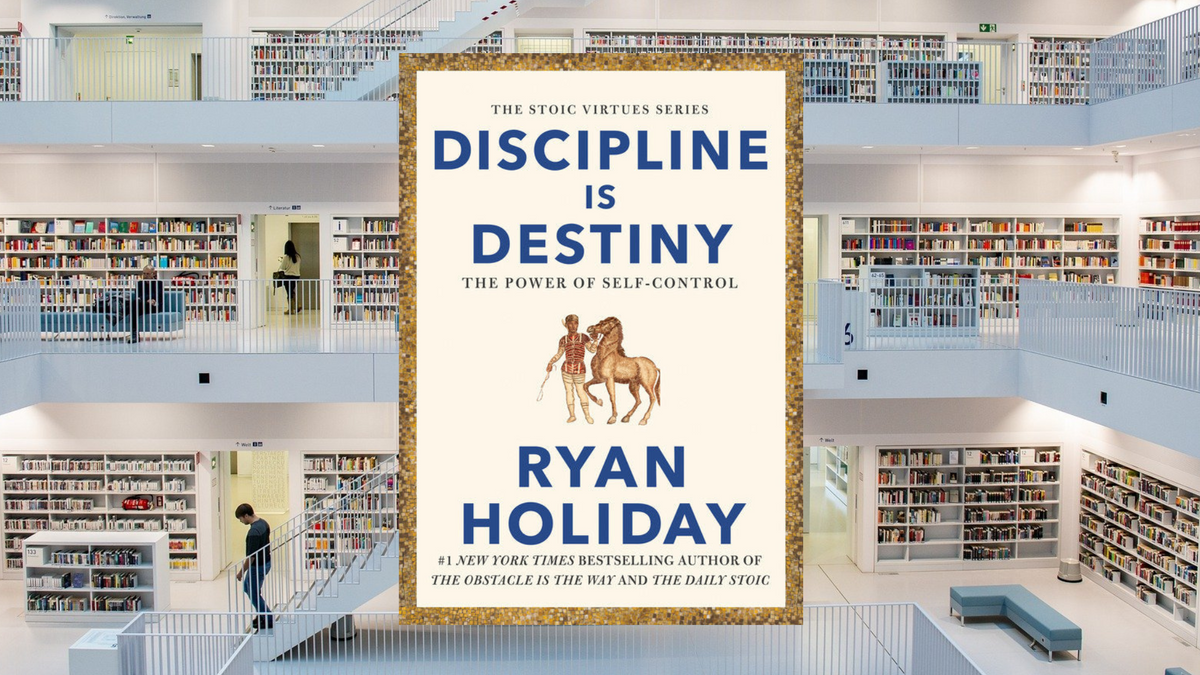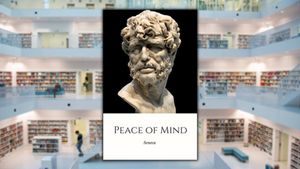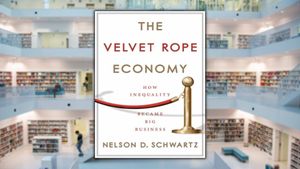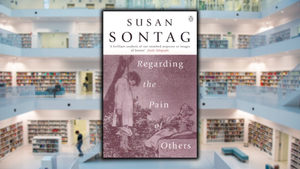
This Book is For:
*Anyone terrified of wasting their lives pursuing meaningless distractions, and who wants to find out exactly what they're capable of achieving.
*Students of philosophy, and especially Stoic philosophy, who love reading stories about the very best that humanity has to offer, and about how they can bring that same knowledge, wisdom, and power into their own lives as well.
*Athletes, entrepreneurs, and professionals in all fields who want to take their skills and careers to the next level, and activate that extra gear inside them that will separate themselves from their competition.
*Everyone who understands that in life, you get out what you put in, and who suspects that they actually have much more inside them left to give.
Summary:
“Most powerful is he who has himself in his own power.”
-Seneca
Self-discipline has traditionally been a hard sell. Self-indulgence, quick dopamine hits, and having a good time have been winning the marketing battle lately, similar to the "battle" between chocolate and asparagus. Or between reality television and educational documentaries. But what if the problem is simply that we've been thinking about self-discipline in entirely the wrong way?
Up until now, self-discipline may have been the equivalent of a Henry James novel in a TikTok world. But Ryan Holiday's book, Discipline is Destiny, will have you reimagining the whole concept in a much more liberating, fulfilling way.
His aim is to teach you how to harness the powers of self-discipline to fulfill your personal destiny. While everyone's destiny is fundamentally different, everyone's destiny is the product of self-discipline. Your habits shape your character, and your character shapes your destiny, and so Ryan's book goes right to the root and gives you the physical, mental, and emotional skillsets for success.
In Discipline is Destiny, he focuses on historical figures who exude the kind of self-discipline and internal strength so many of us wish to emulate - people like Lou Gehrig, Queen Elizabeth II, Marcus Aurelius, Toni Morrison, George Washington, Winston Churchill, Angela Merkel, and so many more.
He also dredges up some cautionary tales from history, using "bad" examples like Napoleon, Alexander the Great, Julius Caesar, and, strangely enough, Babe Ruth. The larger point is that there's something to learn from everyone, even if it's only what not to do.
History shows us what discipline can do, and we can follow along with these epic stories of those who have walked the path of self-mastery before us. In doing so, we uncover more of what's possible to achieve in our own lives. We see in their examples life as it could be, what it looks like to give everything for your dream, and how we can take a step forward ourselves.
Discipline is Destiny is divided into three parts, as follows:
Part I: The Exterior (The Body)
Part II: The Inner Domain (The Temperament)
Part III: The Magisterial (The Soul)
Much like Colin Wilson describes it in The Outsider, balancing the physical, mental, and emotional spheres is the work of a lifetime. It's only the rarest individual who has even been able to approach this level of self-mastery.
In many people, one "center" is much more fully developed than the others. In an even smaller subsection of humanity, individuals have been able to get a pretty good handle on two of them. But attaining perfection in all three?
Still, though, we have to try.
I don't know about you, but I don't want to leave this life knowing that I could have done more. That I could have tried harder, attempted greater things, and attained higher heights. Just like the bodybuilding champion Tom Platz said, I would hate to leave this life knowing that I had...5% left.
In the final analysis, self-discipline is prescriptive. It will show you your future. Your environment, actions, habits, and mindsets are constantly shaping your destiny, and this book will show you how to guide this process more intelligently.
This involves thinking of self-discipline in the "proper" way: not as a punishment, as self-deprivation, but as it really is: a pathway to even greater freedom.
If you think about it, which would rather have: an easy life? Or the strength to endure a difficult one?
The formula is simple: easy choices, hard life. Hard choices, easy life. You put in the work now, to reap the massive benefits later. That's how every positive example profiled in this book has done it.
Through their stories, you'll see that a life of self-mastery, self-improvement, and constant, neverending progress is much more compelling and interesting than one where you're never challenged, never stretched, and never called upon to do anything great with your one and only life.
Some days will be hard. Actually, that's not true...many days will be hard. The hard days will outnumber the easy ones, but the meaningful days will also outnumber the meaningless ones. Living this way won't always be easy, but it will always be worth it.

Key Ideas:
#1: Discipline Equals Freedom
“At the core of this idea of self-mastery is an instinctive reaction against anything that masters us. Who can be free when they have lost, as one addiction specialist put it, ‘the freedom to abstain?’”
The entire concept of self-discipline is due for a total reframe. One of the biggest reasons why conquering laziness, apathy, and vice is so hard for so many people is because they're thinking about self-discipline in entirely the wrong way.
It's not a punishment; it's a gift. By reigning in your worst impulses, you're giving yourself the freedom to max out your life.
Being controlled by externals - whether they be addictions, compulsions, or faulty programming - is no way to go through life. I mean, what kind of life is it if you're able to be dragged about by every impulse, distraction, or temptation that presents itself to your consciousness?
How good does getting drunk really feel when you realize you don't have the power not to?
How fun is social media when the number of likes you get on a post can dictate whether you have a good day or a bad day?
A lack of freedom is horrifying, and the world is often just one great big giant distraction trying to pull your attention and your focus away from your destiny. Every chance the world gets, it will try to pull you away from what matters to you, and you can either make your dreams a reality or be recruited to work on someone else's.
Self-discipline offers us an escape from all that, a way out of the confusion and the pessimism and the hopelessness, and it's a gift that we can give ourselves. Not tomorrow or next week, but right here, today.
But most people don't think about self-discipline this way. They think of it as more like self-deprivation. In reality, discipline actually represents an incredible opportunity to make our time here on this earth every bit as magical as it could be.
There's a saying I love that goes: "Easy choices, hard life. Hard choices, easy life." Amazing! It means that if you keep taking the easy way in life, you're not going to like where you end up. However, if you make the hard choices - if you make some intelligent sacrifices and some tough decisions - you can open yourself up to receive something much greater in the end.
Constraints and limits make everything else possible. For example, the letters in the alphabet need to be arranged in such a way that they have meaning. You can't just type random strings of letters and create art. Grammar, style, and syntax are structures, and constraints that make great works of literature possible in the first place.
In exactly the same way, strict workout regimens create something much more beautiful later on.
Restricting your TV viewing now can give you the freedom to sell your business idea for millions later.
Not getting drunk every weekend can make it possible for you to have a deeper connection with the people you love and care about the most. You have to give up to get.
Another important reframe is that self-discipline is synonymous with self-love. You're not disciplining yourself because you hate yourself - exactly the opposite! You're setting limits because you love yourself, you want the best for yourself, and you're willing to do what it takes to show that you love and value your future self.
You're treating yourself like a really terrific friend, someone you're actually responsible for helping. Like someone you want to see succeed.
Thus, self-discipline is ultimately a positive force; it's certainly not the enemy that it's often made out to be. "Need" itself, addiction - entanglement as such - these are your real enemies.
I'll give the final word here to Ryan Holiday, who explains what it is that we're really quitting:
“In some ways, the habit itself is less important than what we’re really quitting, which is dependency. What the Buddhists call tanha. The thirst. The craving. Maybe with time, you can go back to recreational usage – of whatever it is – yet even to do that, you’re first going to have to quit the habituation. It’s not the sex or the likes or the drink. It’s the need. And it’s this need that is the source of suffering.”
#2: Environment is Destiny
“I tell my students one of the most important things they need to know is when they are their best, creatively. They need to ask themselves, What does the ideal room look like? Is there music? Is there silence? Is there chaos outside, or is there serenity outside? What do I need in order to release my imagination?”
-Toni Morrison
You've probably heard somewhere that you are the average of the 5 people you spend the most time with, but the real-world application of this idea extends far beyond just the people you surround yourself with. It also includes the books you read, the podcasts you listen to, the foods you put into your body, and so much more.
Your environment is constantly influencing you - often beneath your conscious awareness - and the quality of your inputs matters. It matters a ton.
Now, I'm a fairly big proponent of personal integrity and the responsibility of individuals to make their own choices (and face their own consequences). Still, even I recognize the fact that we often don't choose our environments. We are born in specific places, to specific people, and exposed to specific ideas and customs. So the idea that you are completely responsible for everything that happens to you isn't exactly true.
And yet...
And yet it's extraordinarily important to understand that self-discipline isn't "either/or" when it comes to your environment.
"Control the controllable," as the Stoics say, but accept the fact that you take action within an environment, and that environment has a major impact on your ability to delay gratification and craft the kind of life you want for yourself.
One author who understands this extremely well is Johann Hari, who wrote the book, Stolen Focus, where he says:
“The truth is that you are living in a system that is pouring acid on your attention every day, and then you are being told to blame yourself and to fiddle with your own habits while the world's attention burns."
Hari identifies 12 different causes of our fractured attention spans, including the collapse of sustained reading, the velocity of information coming at us all the time, the effect of toxic foods in our diets and in the air we breathe, not to mention the increased demands and stressors faced by all of us in our daily lives.
Who among us can successfully fight back against all that on our own and still find time to meditate every morning, journal for 10 minutes every evening, get to the gym 5 times a week, and not just snap at the person who forgot to hold the door open for you when he obviously saw you coming that one time? I mean, what was that guy even thinking?
Ahem.
Anyway, Hari goes on to write:
“We must understand that the modern world is conspiring against us, working to degrade our ability to endure even the slightest difficulty.”
What all this means for the development of our self-discipline is that we need to pay attention to the effects of our environment on our self-control, and we need to devote significant time to figure out how we can make our environment support our goals, rather than distract us from them.
Who we spend time with matters. What we spend time thinking about and engaging with matters. The books we read and the information we take in matter. But sometimes? Sometimes it's all just too much. Sometimes we need to reduce the inputs, slow down, and only let in the very best, and what will serve us the most.
Read only the best books. Spend time with only the best people. Fuel yourself with the best foods. You deserve nothing less.
Drinking from the firehose of the modern world just confuses and scatters your attention. Hari likens it to hackers threatening a computer system:
“Sometimes, hackers decide to attack a website in a very specific way. They get an enormous number of computers to try to connect to a website all at once - and by doing this, they 'overwhelm its capacity for managing traffic, to the point where it can't be accessed by anyone else, and it goes down.' It crashes. This is called a 'denial-of-service attack.' James thinks we are all living through something like a denial-of-service attack on our minds.
'We're that server, and there's all these things trying to grab our attention by throwing information at us...It undermines our capacity for responding to anything. It leaves us in a state of either distraction, or paralysis.' We are so inundated 'that it fills up your world, and you can't find a place to get a view on all of it and realize that you're so distracted and figure out what to do about it.'"
#3: Consistency is a Superpower
“Think about it: Most people don’t even show up. Of the people who do, most don’t really push themselves. So to show up and be disciplined about daily improvement? You are the rarest of the rare.”
It's so easy to set yourself apart from the crowd today. As they say, it's never crowded along the extra mile, and most people just won't do the work that you're willing to do in order to get ahead. Not even to get ahead - simply to give yourself the mental freedom to do what's best for you and to take your life back.
However, competition can be good for you. It's fun and exciting to match your best against others' bests and see how far you can go, and how much you can achieve.
Measuring yourself against others who are at least slightly ahead of you, in the context of pushing yourself to be as great as you can be, is something I'd recommend to pretty much everyone. You need that measuring stick in front of you to see what's possible.
The fact of the matter is that most people won't read past the first chapter of a book - if they even read at all.
They won't stick to a workout plan when it gets hard, and they won't take any extra classes to give themselves the skills that could enhance their value in the marketplace.
They just won't do it.
That's your competition. That is the average that you're competing against. There is so much low-hanging fruit just waiting for you to step up and take it. There is so much potential out there just waiting to be seized.
When most people are complacent and content with just skating by, it only takes a tiny bit of effort to stand out as someone committed and capable.
Is it going to be slow in the beginning? Of course it will. There's a compounding effect at work here, where the biggest returns lie on the other side of a sustained commitment. But virtually everyone who says yes to that commitment will tell you that it's the greatest decision they've ever made.
A lot of growth is exponential - damn near invisible in the beginning - and only becomes readily apparent with time. You'll gain 2 new YouTube subscribers a week for 3 months, and then you'll start to gain 10. After a year, you'll be adding dozens of new subscribers a day, and when you've been at it for years and years, you'll gain 10,000 subscribers from a single video and people will call you an overnight success.
Back in the real world, you can plainly see that going to the gym once, for 10 hours, isn't going to do it. One workout won't get you into shape. But 20 minutes a day, for 6 weeks? Now we're working! Now the results are showing up! Start today, and in 2 weeks, you'll start to feel it. In 4 weeks, you'll start to see it. And in 6 weeks, people will ask you how.
What's most important to remember here is that people tend to overestimate what they can do in a day, but greatly underestimate what they can accomplish in a year. What the most disciplined people in the world have realized is that you need to get to a point mentally where you are willing to keep going through the process, knowing that's working, without necessarily seeing the results of your actions.
The $100,000,000 CEO, Alex Hormozi, has what he calls the Rule of 100, which is basically when you commit to taking action 100 times, every single day, on the key activity that's going to move the needle for you. In his world, that's making sales calls. Or, at least, it was when he was just starting out.
The idea is that you're committing to doing something important, and doing it enough times, for long enough, such that it then becomes unreasonable to believe that you won't be successful. If you make 100 more sales calls every day, and you do this for the next 365 days, don't you think that you'd make a lot more money? What about writing online? Don't you think that, if you committed to writing just 3 articles per day on Medium, that you would be much further along in your career by the end of the 365 days? Of course you would!
Is it hard to do? It can be! Certainly! It's certainly a time commitment to pick up the phone 100 times a day and work to advance your business. Are barbell squats painful and uncomfortable and frankly, downright boring once you've done thousands of them? Absolutely! But a year of squatting - even once a week - will give you powerful legs and a completely different physique. People know this, but then they don't do it! Herein lies your competitive advantage.
“The good news is that because it’s hard, most people don’t do it. They don’t show up. They can’t even do one tiny thing a day. So yes, you’re alone, out there on the track in the rain. You’re the only one responding on Christmas. But having the lead is, by definition, a little lonely. This is also why it’s quiet in the morning. You have the opportunities all to yourself.”
#4: The Universal Secret to Success
“It is impossible to be committed to anything – professionally or personally – without the discipline to say no to all those other superfluous things. An interview request. A vibrant social media presence. A glamorous dinner party. An exotic trip. A lucrative side venture. An exciting new trend.
No one is saying these things won’t be fun, that they don’t have potential benefits. It’s simply that they also carry with them opportunity costs; they require resources and energy that each person has only so much of.
The secret to success in almost all fields is large, uninterrupted blocks of focused time. And yet, how many people organize their days or lives to make this possible? And then they wonder why they are frazzled, unproductive, overwhelmed, always behind.
Here is the inescapable logic: Everything we say yes to means saying no to something else. No one can be in two places at once. No one can give all their focus to more than one thing. But the power of this reality can also work for you: Every no can also be a yes, a yes to what really matters. To rebuff one opportunity means to cultivate another.”
#5: The Tragic Cost of Intemperance
“The cost is not just personal but shared by us all, in symphonies never written, feats never accomplished, in good never done, the potential of an ordinary day never fulfilled.”
There's something great in this world that only you can do, give, or perform. You're the only one who can do it exactly like you can; you must do it, and if you don't do it, the whole world will be deprived.
If there's something I believe is incontrovertibly true, it's that.
The real cost of ill discipline lies in the unrealized potential inside all of us - including you. You don't need to write a symphony, by the way. Just like you don't need to create the next Facebook, or whatever it is. That's just the outward manifestation of fully-realized potential. And the thing about potential is that we can never see the end of it.
We don't know how great we can be, how much we can give or create. We just don't know the limits of our own potential - not to mention humanity's in general - and so we need to advance.
To advance requires discipline, and it requires the willing assumption of responsibility. Not to meet the expectations of others, but rather to drain today of every last drop of potential. Think of each day as a wet towel, and you're just squeezing it with all your strength, trying to get the absolute most out of it. That's not a bad way to think about potential.
Personally, I feel so strongly about this that I've organized my entire life around the idea of giving my absolute best effort and leaving the results to the universe. Controlling the controllables. Yes, some people say that I get unreasonably upset when people waste my time, but time is what my life is made of. Don't waste my life! It's mine. And I'm not going to waste a single, ordinary, infinite moment if I can help it.
I could easily get carried away here, but for the moment, I'll just say this: For all we know, we'll never come this way again. We'll never be here, on Earth, active and alive and on fire with potential and vision. We have nothing - absolutely nothing - to lose by going all in. By thinking BIG.
If you knew you were going to get another chance, maybe you could sit this one out, or go half-strength, maybe "see how things go." But as it stands right now, you have nothing to lose. Nothing whatsoever. So why would you ever play small with your one and only life?
#6: Your One Definite Chief Aim
“‘Anyone who has not groomed his life in general towards some definite end cannot possibly arrange his individual actions properly,’ the writer Michel de Montaigne reminded himself. If you don’t know where you’re sailing, the Stoics said, no wind is favorable. This means, first, the discipline to step away and think: What am I doing? What are my priorities? What is the most important contribution I make – to my work, to my family, to the world? Then comes the discipline to ignore just about everything else.”
Think and Grow Rich has sold millions of copies, although readers are extremely divided about whether or not it's a good book.
There's some debate around whether the author Napoleon Hill, actually met Andrew Carnegie at all, but there's at least one idea in the book that makes the whole thing worth reading regardless. I'm talking about Hill's discussion of one's "definite chief aim' - the main, overarching goal of one's entire life - and the importance of routing every internal and external resource you have into its achievement.
There's more than one great idea in that book, but that's certainly one of them. Another is the idea of fueling your burning desire for the accomplishment of your Definite Chief Aim. It changed my life forever after I first read about it, and I'm not alone in having that experience.
As Montaigne says in the quote above, having some definite end is crucial when deciding what action to take in the present moment. It all comes down to whether you want to walk a mile in a thousand different directions, or a thousand miles in one direction. Your choice will direct your destiny.
Once you've settled (even temporarily) on a definite chief aim and pledged to pour everything of yourself into its accomplishment, if you add sickening consistency to that formula as well? In that case, it's unreasonable to believe that you won't be successful. You will have stacked a ton of the odds in your favor, and I wouldn't bet against you.
The simple truth is that what you pay attention to becomes your life, and if there's something you want to do, some great thing you want to achieve, or a destiny you wish to fulfill, then you owe it to yourself to get obsessed about your Definite Chief Aim. When the sun shines on the whole earth, it warms the landscape, but when the sun's rays are focused through a magnifying glass, they become incendiary.
And if you're wondering what Socrates thought of this same question (what, you mean you weren't wondering?), he was known to dole out similarly spectacular advice. Asked how one could get to Mount Olympus, he responded, "Make sure every step you take is in that direction."
#7: Possessing the World and Keeping Your Soul
“It’s not uncommon to find someone who has physical command of themselves. Nor is there a shortage of brilliant people who have brought their mind and spirit under control in the pursuit of this profession or that one. What is extraordinarily rare is someone who not only combines these two disciplines, but manages to do so in the so-called arena – in public life, as a doer, a contributor to society.
Of course, temperance and restraint can be found in the monasteries and the mountain retreat; that’s not what we’re after. Can you achieve this stillness, this balance, in the chaos of real life? Surrounded by temptation? Whether the crowd cheers or jeers? Regardless of what would be tolerated, what you could get away with, what people even think is possible?
We call this rare and transcendent plane the Magisterial – mastering yourself, mentally, physically, in command always, in all forms…and somehow finding a gear beyond that, finding more to give, more to draw from yourself. This is the greatness we seek; this is where the body, the mind, and the spirit come together in life’s most stressful situations, when things don’t go our way, in moments of destiny or great difficulty, where we show what all these sacrifices were for, where we show what we were made of, where we prove that it is in fact possible to possess the world and keep our soul.”
#8: The Beautiful Irony
“How much progress could you make if you made just a little each day over the course of an entire life? What might this journey look like, where might it lead, if each bit of progress you made presented both the opportunity and the obligation to make a little more progress, and you seized those opportunities, you lived up to those obligations, each and every time?”
Discipline has to be repeated every day, but it also rewards you every day as well. Seeing progress is one of the most motivating forces in existence, and the more progress you make, the more progress you want to make.
The best part of all this is that it's all part of this one, utterly fascinating journey that none of us can ever see the end of from our current vantage point. We have to set off down the path before we're able to see what's possible for us.
This is also known as the adjacent possible, which means the very next possibility. If you think of it like a room in a mansion, it'll all start to make sense. If you start off not knowing anything about the layout, other than that you're in a room with, say, three doors, all you can be sure of is that you can enter through one of those doors, and you'll advance to the next room. That next room is the adjacent possible - but what lies beyond that? Your future and your potential work in exactly the same way.
Taking consistent, disciplined action toward your goal - with the ultimate goal of realizing your potential - is like crossing the threshold from that first room to the second. You may have some sense of what's in that next room, but once you get inside, you see that there are 3 more doors that you couldn't even see from the previous room. You had to advance in order to see more of the path; you had to make the path by walking.
It reminds me of the lame, but memorable line, "Doors will open for you along the hallway of opportunity, but you have to actually be moving down the hallway."
The beautiful irony here is that since progress is so motivating, it feels so good to keep discovering these extra rooms, but you still just want to keep going. As Ryan Holiday says, "You’re never content with your progress, and yet, you’re always content…because you’re making progress."
Arnold Schwarzennger said the same thing when he pointed out that if you wanted to develop the perfect body, you'd have to keep going on forever. And in the wonderful book, Finite and Infinite Games, Professor James P. Carse points out that the whole "point" of the game of life is to keep the game going! The purpose is to play and to create, never simply to arrive.
So now we can start to see the problem that most people fall into: they're simply not thinking on long enough timescales, and they're too focused on the result to notice how pleasureable the process can be.
To address the first problem, we can adjust our timescales. For most people, a short-term goal could mean something they aim to achieve in the next 3-6 months. That's perfectly acceptable, but for infinite players, "short term" is more flexible. It could easily mean 10 years. If you're 30 years old now, and you expect to live into your eighties and beyond, it's not unreasonable to begin thinking about what a 100-year plan for your life might look like.
You smile, but I'm serious! The futuristic medical advances that are, even today, a present reality are nothing less than astonishing in their implications, and a lot can happen in the next 50+ years. If can eradicate smallpox, why not cancer? Penicillin was a miracle, but what other miracles are coming down the line?
The point is that you just don't know. And when you start to combine some of these key ideas - consistency, your Definite Chief Aim, the adjacent possible - it's suddenly not so crazy to start thinking big thoughts, and dreaming up massive adventures.
Achieving your Definite Chief Aim could take your entire life. But what else is worth doing? What do you have to lose, what do you think is so threatening, that it's not worth giving every single thing you have within you to achieve it? What's stopping you from climbing to the top of that hill, so that you can see all the new hills stretching out from behind it? That's what living is!
What you want are new adventures, new challenges, and new problems to solve that are worthy of your efforts and your struggles. And the important thing to remember in all this is that from where you are, you just don't know how far you can go. I will tell you, though, that discipline will be your most constant and valuable traveling companion. It'll help you get there.
But once you're "there," will you choose to keep going? Will you continue on even when you’ve reached further than you ever thought you could go? Or will you stop there?
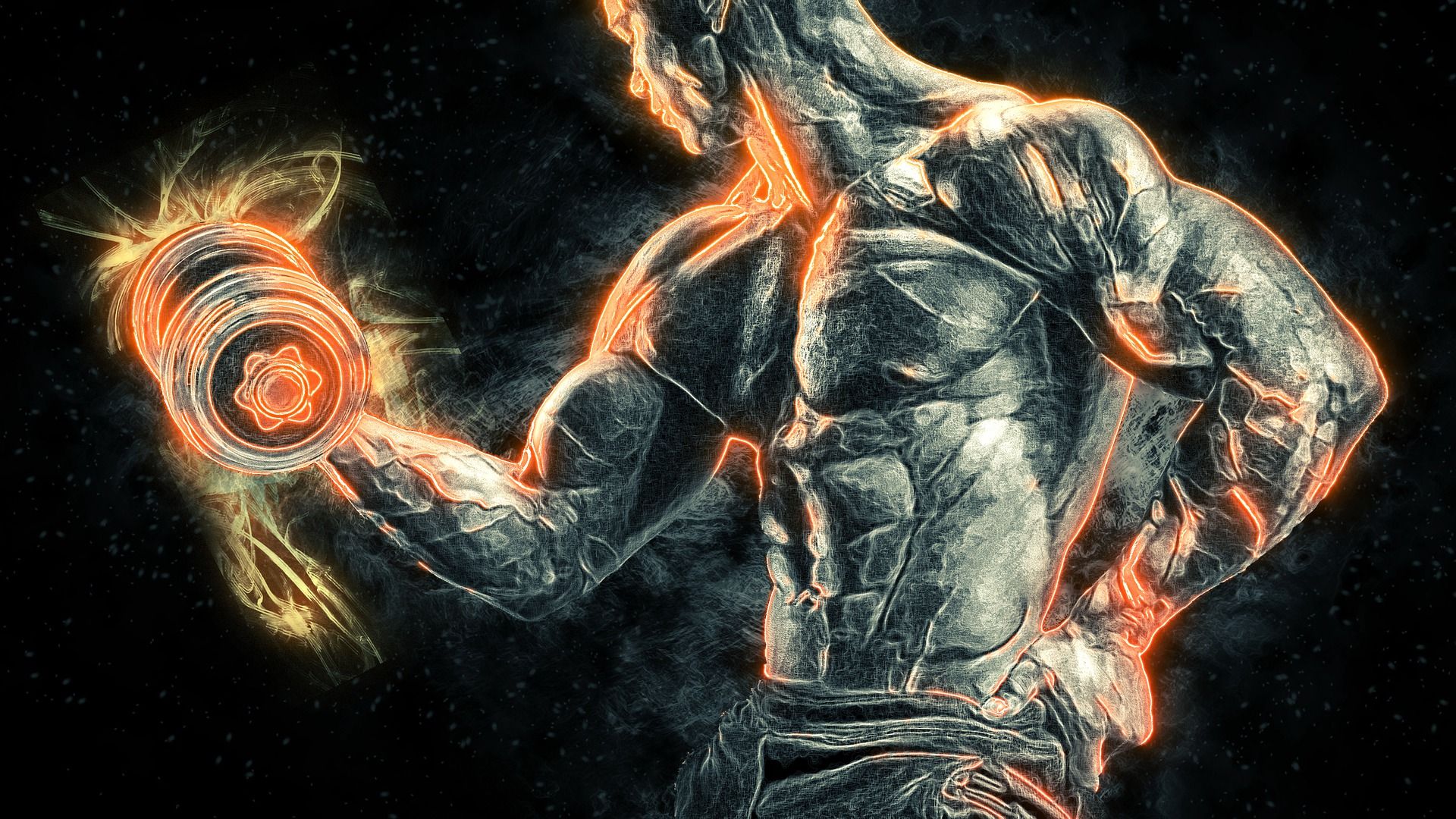
Book Notes:
“Will you remain as you are? Or become what you’re capable of?”
“Will we be selfish or selfless? Brave or afraid? Strong or weak? Wise or stupid? Will we cultivate a good habit or a bad one? Courage or cowardice? The bliss of ignorance or the challenge of a new idea? Stay the same…or grow? The easy way or the right way?”
“Would you have a great empire? Rule over yourself.”
-Publilius Syrus
“Freedom is the opportunity for self-discipline.”
-Dwight D. Eisenhauer
“Life is not fair. Gifts are not handed out evenly. And the reality of this inequity is that those of us coming from a disadvantage have to be even more disciplined to have a chance. They have to work harder; they have less room for error. Even those with fewer freedoms still face countless daily choices about which urges to indulge, what actions they’ll take, what they’ll accept or demand from themselves.”
“Discipline, then, is both prescriptive and deterministic. It makes it more likely you’ll be successful, and it ensures, success or failure, that whatever happens, you are great.”
“Failing to realize your potential is a terrible punishment.”
“Greed moves the goalposts.”
“Name someone truly great without self-discipline. Name one calamitous undoing that was not, at least in part, rooted in a lack of self-discipline.”
“When you love the work, you don’t cheat it or the demands it asks of you.”
“Gehrig, as it happened, continued to live with his parents for his first ten seasons, often taking the subway to the stadium. More than financially comfortable, he later owned a small house in New Rochelle. To Gehrig, money was at best a tool, at worst a temptation.”
“As the Yankees reigned over the game, the team was treated to an upgraded dugout, with padded seats replacing the old Spartan bench. Gehrig was spotted by the team’s manager tearing off a section. ‘I get tired of sitting on cushions,’ he said of the posh life of an athlete in his prime. ‘Cushions in my car, cushions on the chairs at home – every place I go they have cushions.’
He knew that getting comfortable was the enemy, and that success is an endless series of invitations to get comfortable. It’s easy to be disciplined when you have nothing. What about when you have everything?”
“Let the headlines go to whoever wanted them.”
“’I guess the streak’s over,’ a pitcher joked after knocking Gehrig unconscious with a pitch in June 1934. For five terrible minutes, he lay there, unmoving, dead to the world – death being a real possibility in the era before helmets.
He was rushed to the hospital, and most expected he’d be out for two weeks even if the X-ray for a skull fracture came back negative. Again, he was back in the batter’s box the next day.
Still, you might have expected a hesitation, a flinch when the next ball came hurtling toward him. That’s why pitchers will bean a batter from time to time – because it makes them cautious, the batter’s instinct for self-preservation causes them to step back, in a game where a millimeter may make all the difference.
Instead, Gehrig leaned in…and hit a triple. A few innings later, he hit another. And before the game was rained out, he hit his third…while recovering from a nearly fatal blow to the brain. ‘A thing like that can’t stop us Dutchmen,’ was his only postgame comment.”
“As the starting lineup was called over the loudspeakers to some twelve thousand people in Detroit, the announcer was just as stunned. For the first time in 2,130 games, Gehrig’s name was not to be called. Still, the announcer couldn’t help himself, ‘How about a hand for Lou Gehrig, who played 2,130 games in a row before he benched himself.’”
“Because yes, even the greats could have been greater.”
“Nearly half of young Americans are actually ineligible to join the US military for health or fitness reasons.”
“The only way to stop is to stop.”
“Show me a man who isn’t a slave.”
-Seneca
“Nothing is cheap if it is superfluous.”
-Cato the Elder
“Cato lived in a modest home, inspired by one of his heroes, Manius Curius. At the height of the great conqueror’s powers, some men were sent to bribe Curius but found him in his kitchen boiling turnips. In an instant, they knew their mission was futile. A man satisfied with so little could never be tempted.”
“The more a man is, the less he wants.”
-Maxwell Perkins
"Be regular and orderly in your life, so that you may be violent and original in your work.”
-Gustave Flaubert
“You don’t have to always be amazing. You do always have to show up.”
“Success breeds softness.”
“They refer now to the idea of sleep discipline. It’s something you not only have to do, but something you have to enforce in yourself – in terms of both quantity and quality. The higher the stakes, the more driven you are, the more stressful the situation, the more discipline sleep requires.”
“The best way to master the morning is to have mastered it the night before.”
“Discipline is how we free ourselves.”
“Greatness is not just what one does, but also what one refuses to do.”
“‘Most people have a job and then they go home,’ the Queen once reflected, ‘and in this existence, the job and the life go on together, because you can’t really divide it up.’ There is no better definition of the path of temperance. It’s an all-consuming, full-time thing. It’s the journey of a lifetime, one that gets more impressive (and rewarding) the longer you stay at it.”
“Washington wasn’t naturally Stoic; he made himself this way. Not permanently but anew every minute, every day, in every situation, as best he could.”
“Perhaps this is what makes an anecdote about General James Mattis from his time as secretary of defense so unusual. Mattis, notoriously private and duty-bound, was not interested in doing the rounds of Sunday-morning talk shows that Washington politicians usually line up for like hogs at the trough.
He didn’t care about his brand. He didn’t care about playing the game. No, he wanted to work. He wanted to actually get things done.
Begged, prodded, bothered, and then criticized by administration officials for not helping them get messages out, he finally called the media office and very calmly reiterated his ‘no.’ ‘I’ve killed people for a living,’ he explained. ‘If you call me again, I’m going to fucking send you to Afghanistan. Are we clear?’ And that was the end of that.”
“No one can say yes to their destiny without saying no to what is clearly someone else’s.”
“One cannot always create on the same level. The Sixth Symphony followed the Fifth, but without the Sixth, we could not have had the Seventh. One cannot know what one is leading into. Transitions are as important as achievements.”
-Louis Horst
“Perfect is not just the enemy of the good, as they say, but it’s the enemy of everything that might come after. If you get stuck, your potential does too. This is why finishing is itself an achievement, an act of monumental discipline that must happen.”
“You need to be able to stop yourself, to say, finally, this is done.”
“Anything you can do another day can be done now.”
-Michel de Montaigne
“He who postpones the hour of living right is like the rustic who waits for the river to run out before he crosses.”
-Horace
“You could be good now. Instead, you chose tomorrow.”
“The time to do it is now. The time to get started is now. The thing to start with is the hard part, the part you want to do the least. Not begrudgingly, but promptly and enthusiastically, with a body that’s been trained for hard work and a mind that’s sharp and focused.”
“Even the most cheerful, even the strongest, even the most self-disciplined of us will stagger under the weight of our circumstances or the consequences of our behavior.
We remember Viktor Frankl today as an unflagging optimist, the unwavering believer in human meaning despite the horrors he endured in the Holocaust. And yet, there is a note he sent to some friends in 1945, just after the war ended, that read:
‘I am unspeakably tired, unspeakably sad, unspeakably lonely…In the camp, you really believed you had reached the low point of life – and then, when you came back, you were forced to see that things had not lasted, everything that had sustained you had been destroyed, that at the time when you have become human again, you could sink into an even more bottomless suffering.’
It’s hard to blame him. It is also unfathomable to think of what humanity would have been deprived of if he had wallowed there, or, worse, given up.”
“Discipline is not a punishment, it’s a way to avoid punishment. We do it because we love ourselves, we value ourselves and what we do. And we find, conveniently enough, that it also heightens our enjoyment of things as well.”
“Seek yourself, not distraction.”
“Nearly every regret, every mistake, every embarrassing moment – whether it be personal or professional or historical – have one thing in common: Somebody lost control of their emotions. Somebody got carried away. Somebody was scared or defensive. Somebody wasn’t thinking beyond the next few seconds.”
“If you cannot rein in your impulses now, if you can be jerked like a puppet today, how do you think it will go when you reach the level you aspire to? When you have power, when you have people willing to make excuses for you, when you have resources? And, too, when the margin for error is much smaller? People who are doing less important things than you can get away with not being in control. You can’t.”
“An expert on speaking also knows when not to do so.”
-Archimedes
“Let them wish you talked more. Let them wonder what you’re thinking. Let the words you speak carry extra weight precisely because they are rare. You can answer the question with, ‘I don’t know.’ You can ignore the insult. You can decline the invitation. You can decide not to explain your reasons. You can allow for a pause. You can put it down in your journal instead. You can listen. You can sit with the silence. You can let your actions do the talking. You can listen more than you talk. You can speak only when you’re certain it’s not better left unsaid.”
“The poet Juvenal remarked that the whole world had not been big enough to contain Alexander…but in the end, a coffin was sufficient. And what had it all been for?”
“Marius commanded armies, ambition commanded Marius.”
“We don’t need accomplishments to feel good or to be good enough. What do we need? The truth: not much! Some food and water. Work that we can challenge ourselves with. A calm mind in the midst of adversity. Sleep. A solid routine. A cause we are committed to. Something we’re getting better at. Everything else is extra. Or worse, as history has shown countless times, the source of our painful downfall.”
“Poor people have poor-people problems and rich people have rich-people problems because people always have problems. You’re always going to be subject to the necessity of self-discipline. Or at least, you’ll never be immune from the consequences of ignoring it.”
“All you really need is enough money to be comfortable enough to politely say, ‘No, thanks. I’d rather not.’”
“We cannot remain as we are.”
-Socrates
“Is it a little discouraging that we never seem to ‘arrive’? That our standards rise just out of reach of our abilities? Absolutely not! We move the goalposts so the game doesn’t get boring and, more importantly, so it never ends. Ultimately, this brings us more pleasure and more satisfaction. We reach heights we’d never have been able to see otherwise.”
“Each of us must know what an hour of our time is worth.”
“Take a minute to think about how you spent the last year, the last month, the last week, the last day. Think about how much of it was wasted, how much of it was half-assed, how much of it was spent in reaction to things out of your control. And even if you have decent results to show for this time, still, you could have done better. We all could have.”
“Most of the people doing important work are people you’ve never heard of.”
“If you’re not giving your best, why are you doing it at all?”
“Because soon enough, you will be truly tested – beyond the ordinary ways in which you have had to persist and resist on this journey toward your best self. Life will demand something greater, something bordering on heroic. Your body, your mind, your spirit will have to align so that you might discover that you are capable of more than you thought possible.”
“When we rule ourselves, we have the responsibilities of sovereigns, not of subjects.”
-Theodore Roosevelt
“The kind of character that Marcus Aurelius cultivated was such that it brought distinction to his position, rather than the position bringing honor to his person.”
“I am prepared to forgive everybody’s mistakes except my own.”
-Cato the Elder
“Search others for their virtues, thyself for thy vices.”
-Ben Franklin
“It’s so hard to let people get away with things you’d never allow in yourself. To let them do things you know are bad for them, to let them slack off when you see so much more in them. But you have to. Because their life is not in your control. Because you’ll burn yourself out if you can’t get to a place where you live and let live.
Credit them for trying. Credit them for context. Forgive. Forget. Help them get better, if they’re open to the help. Not everyone has trained like you have. Not everyone has the knowledge you have. Not everyone has the willpower or the commitment you have.
Not everyone signed up for this kind of life, either! Which is why you need to be tolerant, even generous with people. Anything else is unfair. It’s also counterproductive.”
“The path that a great man follows becomes a guide to the world.”
-The Bhagavad Gita
“Happy is the man who can make others better, not merely when he is in their company, but even when he is in their thoughts.”
-Seneca
“For the people we love, we are strong enough to get through anything.”
“We do it because they’re watching – our kids, our followers, our students, the world at large. We not only don’t want to let them down, we want to inspire them, we want to show them what’s possible.”
“The leader takes the hit. Everything else is just semantics and titles.”
“The more you have, the more selfless you must be.”
“First in line for danger, last in line for rewards. First in line for duty, last in line for recognition.”
“What progress have I made? I have begun to be a friend to myself.”
-Seneca
“Precisely when we think we’ve earned the right to relax our discipline is exactly when we need it most.”
“It’s at the height of our powers that we need the clearest mind.”
“We have a choice. We choose between self-control and ill-discipline, virtue and vice. Self-control must be observed physically. It must be embodied mentally. It must be rendered magisterially when our moment comes. It’s our decision what this will look like. Not just once, but a thousand times in life. Not just in the past and the future but right now, today. What will it be? Dependence or independence? Greatness or ruin? Discipline is destiny. It decides. Will you choose it?”

Important Insights from Related Books:
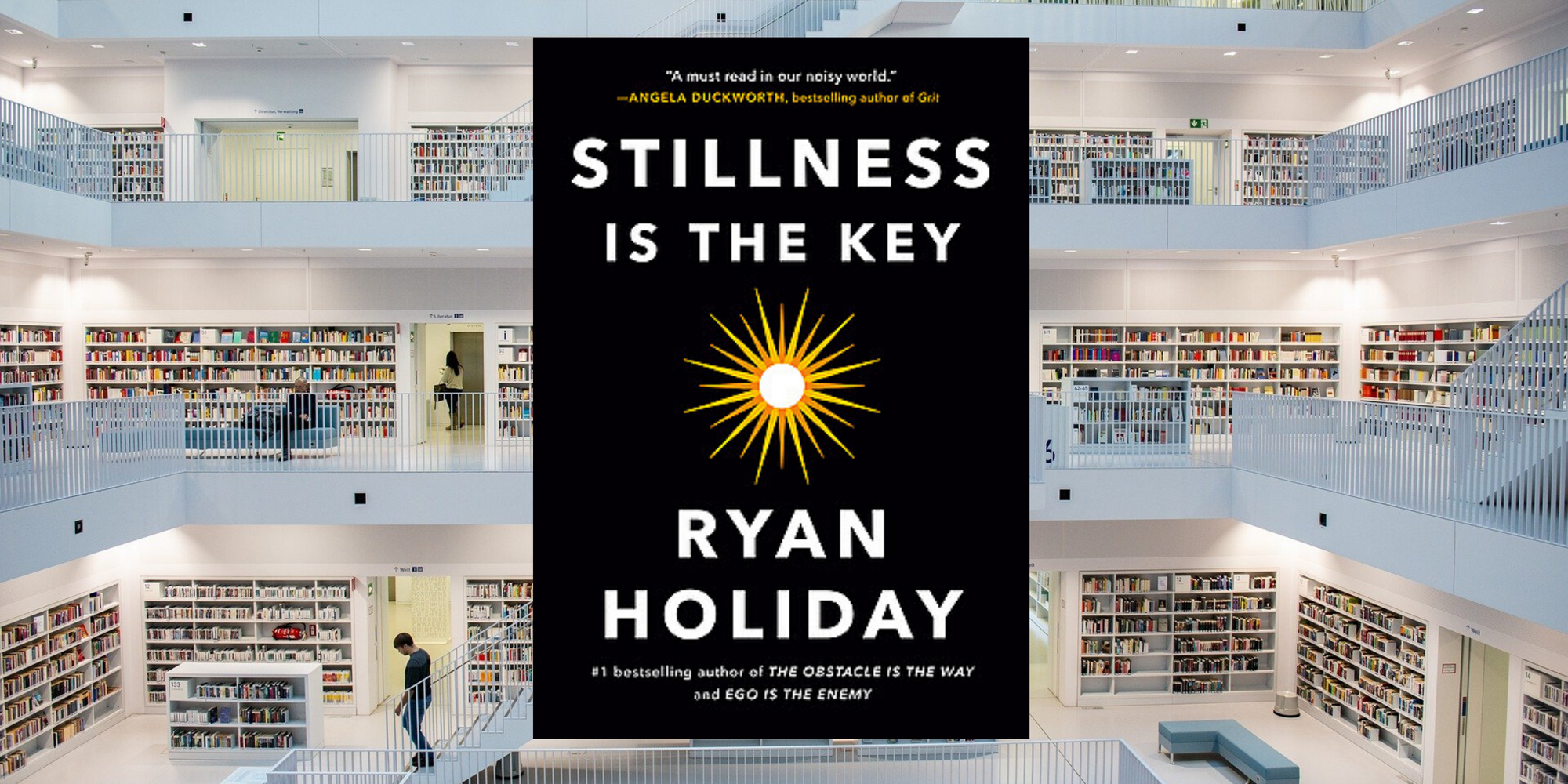
Stillness is the Key, by Ryan Holiday:
If you can tolerate enough boredom, you can achieve pretty much anything. Almost everything worth achieving isn’t going to be the result of one single exciting event, but rather the sum total (or sometimes, the exponential total) of relatively unexciting actions, repeated over and over and over again until your personal summit is reached.
Moreover, the realms of stillness and achievement are inextricably linked, and Ryan Holiday makes that abundantly clear in Stillness is the Key.
Now obviously, there’s a lot more to stillness than just boredom. Indeed, whenever such a wide range of societies, belief systems, and successful individuals all converge on one idea as being of singular importance - in this case, stillness - then you know that it’s important and that you overlook its significance at your peril.
There’s so much untapped power in stillness, and this book is like a powder keg.
Through the stories of people like Confucius, Seneca, Marcus Aurelius, Thich Nhat Hanh, Nietzsche, Fred Rogers, Anne Frank, Winston Churchill - and on and on - Ryan Holiday’s book will show you that stillness isn’t just “sitting still,” or silence, but a superpower that will lead directly to self-mastery, discipline, focus, achievement, and, indirectly, to personal fulfillment.
Sample Quotes from the Book:
“The call to stillness comes quietly. The modern world does not.”
“Always think about what you're really being asked to give. Because the answer is often 'a piece of your life', usually in exchange for something you don't even want."
“You can’t escape - with your body - problems that exist in your mind and soul.”
Read the Full Breakdown: Stillness is the Key, by Ryan Holiday
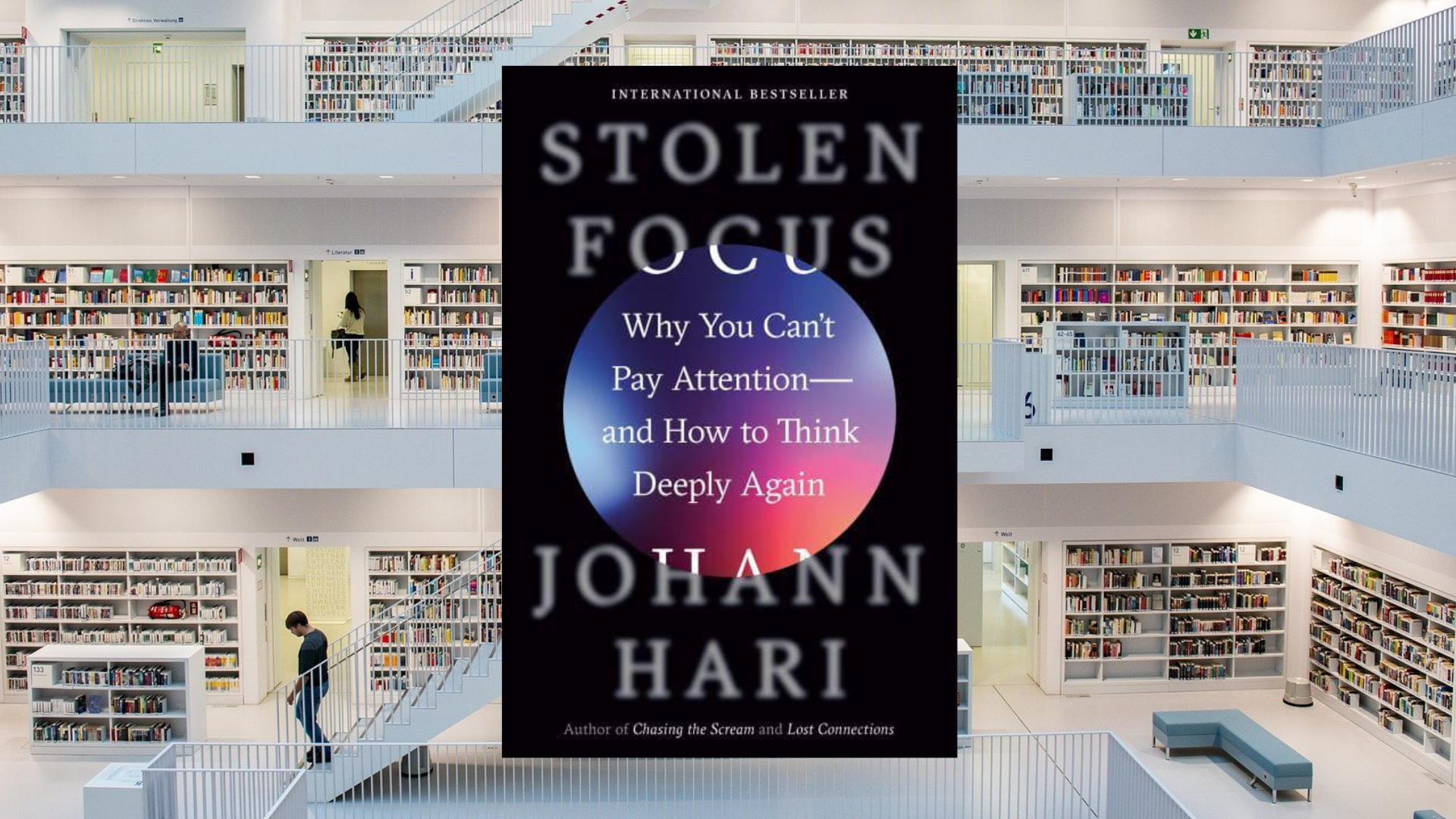
Stolen Focus, by Johann Hari:
This important book demands the kind of attention and deep, nuanced thought that we as individuals and as a society are becoming less able to devote to anything.
In Stolen Focus, Johann Hari investigates 12 distinct causes of our dwindling attention spans - several of them systematic causes - and offers a degree of hope, even though none of us are able to win the battle for our attention alone.
Perhaps one of the most important takeaways from the entire book is that your increasing inability to focus is not completely your fault, and believing that it is a personal failing of yours is simply unhelpful in the very worst way.
The fact is that you and I are living within a society that is systematically siphoning off your attention. As valuable as self-discipline is, it's not going to be enough to solve what Hari calls "the attention crisis."
And it really is a crisis. I mean, you've got the average American worker being distracted roughly once every three minutes, and even the average CEO of a Fortune 500 company gets just twenty-eight uninterrupted minutes a day. A day!
The reality is that today, around one in five car accidents is due to a distracted driver, and untold millions of people struggle every day with the simple act of putting down their phones. But it's not their fault, says Hari, because every time you try to put down your phone, there are a thousand engineers on the other side of the screen working against you. What kind of personal will or self-discipline can stand alone against that?
In the process of attempting to reclaim his own mind and his own ability to focus, he ended up interviewing a multitude of experts - computer scientists, social scientists, educators, psychologists, neuroscientists, technologists, etc. - and the result is this impeccably researched and insightful book.
Sample Quotes from the Book:
“The truth is that you are living in a system that is pouring acid on your attention every day, and then you are being told to blame yourself and to fiddle with your own habits while the world's attention burns."
“We told ourselves we could have a massive expansion in the amount of information we are exposed to, and the speed at which it hits us, with no costs. This is a delusion: It becomes exhausting."
“Later, I asked him - if I put you in charge of the world, and you wanted to ruin people's ability to pay attention, what would you do? He thought about it for a moment, and said: 'Probably about what our society is doing.'"
Read the Full Breakdown: Stolen Focus, by Johann Hari

Be Your Future Self Now, by Dr. Benjamin Hardy:
Dr. Benjamin Hardy is the world's leading expert on the science of prospection and the Future Self concept.
Be Your Future Self Now is one of the absolute best introductions to the field, and inside this book you're going to learn exactly why having a vision for your own future development is so critically important. But you're also going to receive practical instruction on how to apply the science here and now to make your actual life better. Immediately. Today.
Basically, who and what you're becoming - and your thoughts about it - directly affect the quality of your experience in the here and now.
Not only that, but when your imagined Future Self directs your behavior rather than your behavior being directed by your past, that can be the shift that changes your entire life's trajectory.
Instead of running away from something you don't want (pain in your past), you'll be moving toward an exciting future that gives meaning to all of your subsequent days. To this day.
You don't have to wait for some distant day to be the person you love being. In fact, if you're always "trying" to become your Future Self, you'll never get there. You'll always be your current self, trying to become someone else. But if you are your Future Self now, you don't have to wait.
The time is going to pass anyway, and you may as well use it to become the best version of yourself. The future will always be uncertain, but one thing will always remain true, and that is that regret for a life only partially lived is the ultimate pain.
Sample Quotes from the Book:
“The first and most fundamental threat to your Future Self is not having hope in your future. Without hope, the present loses meaning. Without hope, you don't have clear goals or a sense of purpose for your life. Without hope, there is no way. Without hope, you decay."
“You can expect the future to take a definite form or you can treat it as hazily uncertain. If you treat your future as something definite, it makes sense to understand it in advance and to work to shape it. But if you expect an indefinite future ruled by randomness, you will give up trying to master it."
-Peter Thiel
“Anything that isn’t taking you toward your Future Self is a lesser goal."
Read the Full Breakdown: Be Your Future Self Now, by Dr. Benajmin Hardy
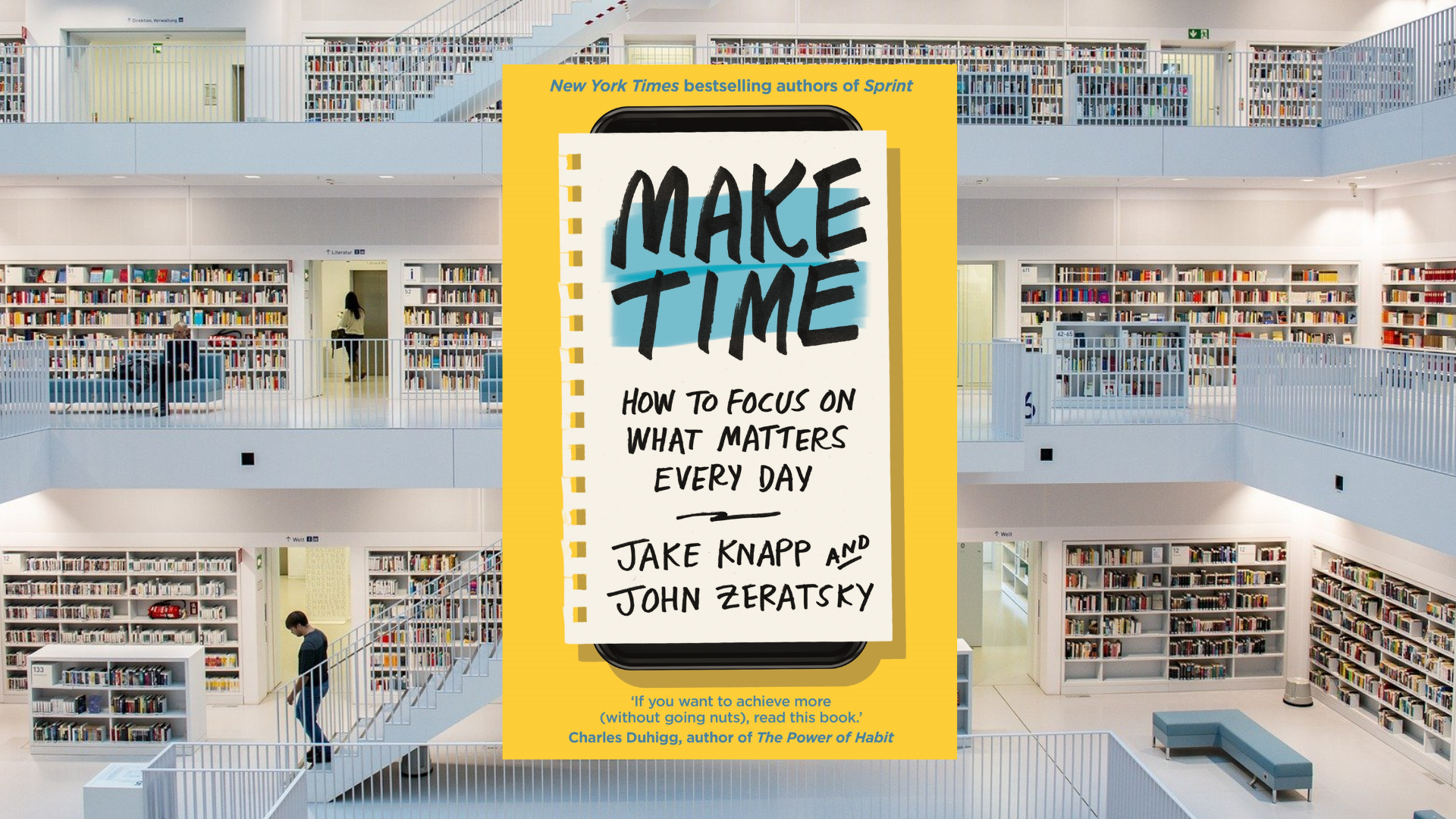
Make Time, by Jake Knapp and John Zeratsky:
Books are like a handful of silence, and books like Make Time are like an oasis of sanity and calm within the chaos of our busy, ever-accelerating lives.
The authors, Jake Knapp and John Zeratsky are two tech innovators with deep domain experience and expertise who recently made the shift from being part of the problem to being part of the solution.
They've also spent years experimenting with their own habits and routines and engaging thoughtfully with the deeper questions of the proper role of technology in our lives, and the end result is this book.
Make Time presents a dead-simple, 4-step system for setting daily targets, improving focus, eliminating distractions, optimizing energy, and reflecting on what works for you and what doesn't so that you can begin to design your days and become the intentional architect of your own life.
That being said, Make Time isn't supposed to be a complete diagnosis and cure for the state of distraction in the world today - it's just supposed to help you make some time for the things that are actually important to you and to bring more joy into your work and your life. And at that task, the book succeeds beautifully.
Alongside the 4-step strategy for making time, the authors include 87 different tactics that will actually help you do that!
They also place a heavy emphasis on experimentation, making a case for trying out the tactics that look interesting, useful, or doable, reflecting on what works for you and what doesn't, and trying again tomorrow.
Sample Quotes from the Book:
“When you schedule something, you're making a commitment to yourself, sending yourself a tiny message that says: 'I'm going to do this.'"
“In reality, a structured day creates freedom. When you don't have a plan, you have to decide constantly what to do next, and you might get distracted thinking about all the things you should or could do.
But a completely planned day provides the freedom to focus on the moment. Instead of thinking about what to do next, you're free to focus on how to do it. You can be in the flow, trusting the plan set out by your past self."
“Despite the consequences, I am so much happier now. Dramatically, drastically happier. When I 'hit bottom,' I felt like I had lost control of my own brain. There is no social media meme or planning convenience that can compete with the feeling of having my mind back."
Read the Full Breakdown: Make Time, by Jake Knapp and John Zeratsky
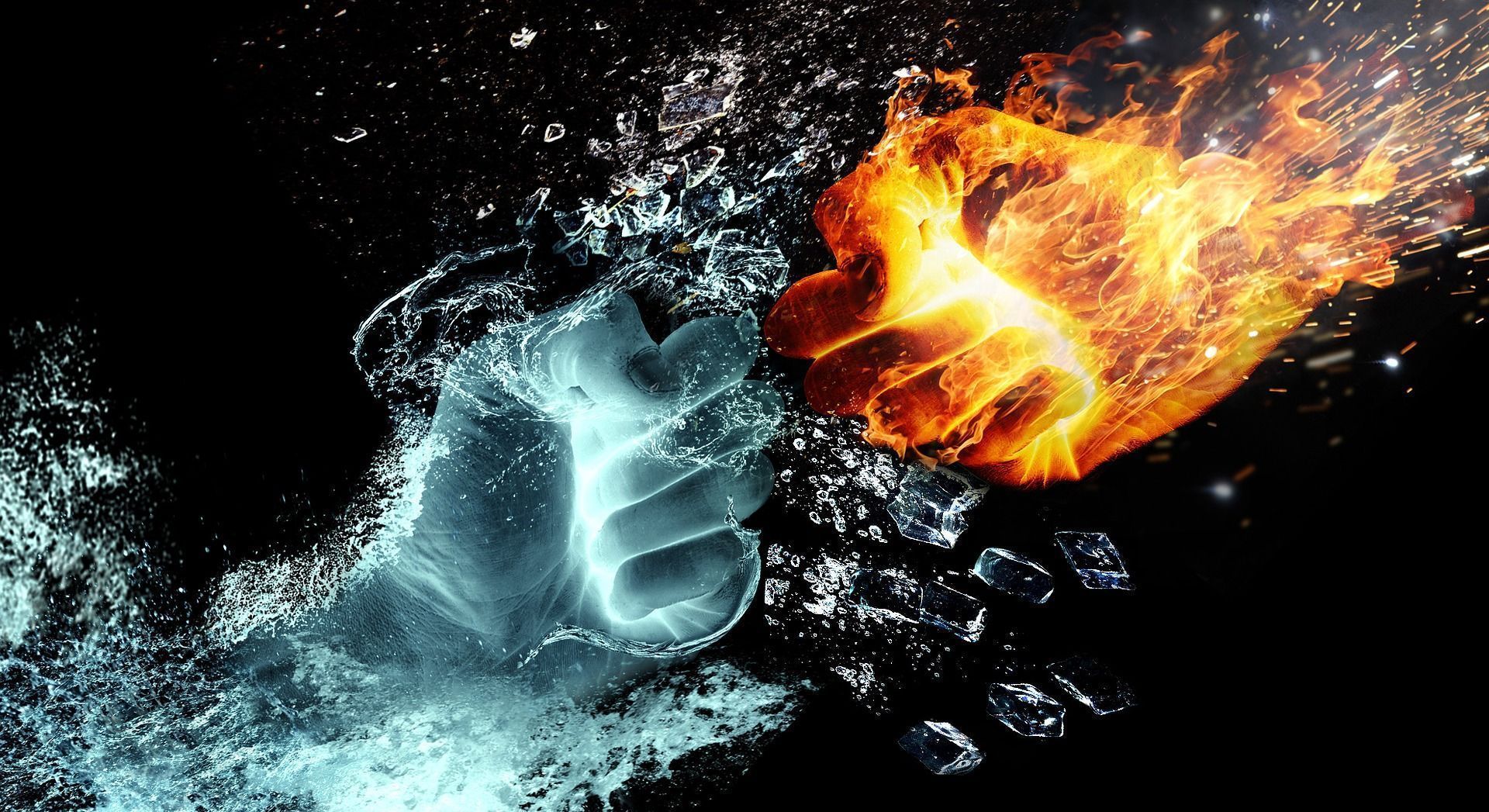
The View from the Opposition:
No one's ideas are beyond questioning. In this section, I argue the case for the opposition and raise some points you might wish to evaluate for yourself while reading this book.
#1: Haven't We Heard This Before?
Plenty of people are tired of Ryan Holiday's writing style, or "formula," by now. I'm not one of them, but I do kinda see their point. He uses a lot of the same historical examples in several of his books, and that can certainly get repetitive.
Just like everyone who reads pop psychology books is tired of hearing about Phineas Gage and that damn railway spike (and don't even get me started on "the marshmallow test), reading the same recycled examples can certainly get repetitive.
But if this is one of the first Ryan Holiday books you've ever read, maybe you'll love it. It'll feel fresh, and even if you've read some of this stuff before, the strongest and most durable learning comes through repetition.
Reading something once is certainly good, but for the best ideas and lessons to penetrate your consciousness and change your paradigm, you need to be exposed to them again and again.
And what's wrong with constantly being exposed to the greatest examples of the power of self-discipline and self-mastery ever recorded?
Instead of just saying, "Yea, I read that already," maybe people would want to burn these ideas and examples into their brains and bring those others' strength and wisdom into their own lives.
#2: Too Much or Too Little?
A few critics will try to claim that all this talk about self-discipline and temperance just drains all the fun out of life, and makes living into this "very serious game" that people are taking a little too seriously.
While I sympathize with the viewpoint that living is supposed to be synonymous with joy, I also believe that there hasn't been enough emphasis on the importance of developing self-discipline, and that Ryan Holiday's book is simply trying to right this wrong.
What some have called cultural gravity - the tendency for the people in our environment to make us more like them, and to draw us closer to the results they themselves are getting - isn't always a bad thing. We need more strong, influential voices making the case for self-discipline.
As is usually true, you simply want to have a little bit of balance.
You can easily take self-discipline too far and just be a total drag on anyone and everyone around you, but for most people, the problem isn't "too much" self-discipline; it's not nearly enough.
"The test of a first-rate intelligence is the ability to hold two opposed ideas in the mind at the same time and still retain the ability to function.”
-F. Scott Fitzgerald

Questions to Stimulate Your Thinking:
The quality of your questions determines the quality of your life. That's also how you get the absolute most out of any book that you decide to read:
You ask great questions the whole time - as though the book was on trial for its life.
Here in this section are a few questions that can help guide and stimulate your thinking, but try to come up with your own additional questions, especially if you decide to read this book the whole way through...
#1: "What's your one Definite Chief Aim? Do you have one? What are some smaller goals or priorities you're willing to sacrifice for the sake of this much larger goal?"
#2: "Think back to the last time you made significant progress on a goal that was important or meaningful to you. Do you remember how that progress felt? Were you inspired to take further action, to see how much further you could go?"
#3: "Of your three 'spheres' - physical, mental, and emotional - which of them is most developed? Have you been ignoring one of them more than the others? What could you do to get yourself back on track?"
#4: "Does your environment support your intention to become more disciplined? What kinds of positive or negative forces are influencing you each and every day, nudging you down one path or the other? What can you do to change that or double down on it?"
#5: "Whose personal example do you look up t when it comes to personal responsibility, self-mastery, and self-discipline? How long did it take them to develop those qualities? How could you start developing those qualities within yourself? And could you start today?"
"Judge a man by his questions, rather than by his answers."
-Voltaire

Action Steps:
So you've finished reading. What do you do now?
Reading for pleasure is great, and I wholeheartedly support it. However, I am intensely practical when I'm reading for a particular purpose. I want a result. I want to take what I've learned and apply it to my one and only life to make it better!
Because that's really what the Great Books all say. They all say: "You must change your life!" So here, below, are some suggestions for how you can apply the wisdom found in this breakdown to improve your actual life.
Please commit to taking massive action on this immediately! Acting on what you've learned here today will also help you solidify it in your long-term memory. So there's a double benefit! Let's begin...
#1: Show Up
The comedian Woody Allen once said that 80% of success is just showing up, and I don't think that's too far off the mark. You have to "stand up and be counted" if you want to make your life's vision a reality and make meaningful progress on your biggest goals.
Since you can bet that most people just won't show up at all, simply by taking some sort of positive action, you already begin to separate yourself from the competition. Whether that competition is your former self, or someone out in the real world is up to you.
So start showing up. You don't have to write a mega-successful screenplay your first time out, but you do have to sit down at the typewriter (I guess nobody uses typewriters anymore, but you get the idea). You don't have to set out to become Mr. Olympia, but you do have to lace up your running shoes.
Show up when you say you're going to be there, and follow through on what you said you wanted to do in the first place. But most importantly, show up for yourself, and remind yourself through your actions that this is important to you, and that you're the kind of person who shows up and takes action.
#2: Practice Going Without
“There was nothing they could take from him that he had not practiced going without.”
The Roman statesman, Seneca, used to go months at a time sleeping on the ground, and eating the worst kinds of food you could feed a human being without them dying of malnutrition.
He didn't do this because he was poor, but because he was rich (one of the richest men in the entire Empire, actually), and he knew the vital importance of preventing himself from becoming soft. So he practiced going without.
Arguments can be made that this wasn't "real" deprivation, because he always had the option to quit and return to luxury - but that's beside the point. He didn't quit, because he knew that the chains of habit are too soft to be felt, until they're too strong to be broken. He had to defend himself against undeserved comfort, and so do we.
Human beings can survive 30 days without food you don't need to eat. But it's about more than that. It's about freeing yourself from dependency, and quitting while you can.
So, for this to work, pick one thing at a time that you absolutely love more than anything in the world, and practice going without it for just one month. See how you feel. Whether it's coffee, video games, cigarettes, or something else, deprive yourself of it temporarily so you can give yourself the freedom to abstain.
#3: Do the Hard Thing Instead
If you have a to-do list jammed with important tasks, it's usually the easy ones you do first. That's how most people are, but you don't have to be like most people. You can do the hard things first, and train yourself to endure discomfort.
Instead of putting off the most difficult tasks and activities in your day, do them first. And instead of doing the easiest possible version of that, do it the hard way. Not the inefficient way, just the same activity at a higher difficulty level. Increase the speed of the treadmill by 2.0. Instead of putting off that uncomfortable conversation, tell the other person how what they did made you feel. Read the philosophy book instead of the romance novel.
Train yourself to love doing hard things, and along the way, you'll realize that you always had the capacity to face them. Now you're stepping into your own power.
#4: Prioritize Recovery
“The most surefire way to make yourself more fragile, to cut your career short, is to be undisciplined about rest and recovery, to push yourself too hard, too fast, to overtrain and to pursue the false economy of overwork. Manage the load.”
Rest is not for the weak! It's for the people who are already strong, and who want to get stronger. Proper recovery is such a key ingredient across all sorts of performance measures, and yet there's often this misplaced "tough guy" ethos with people thinking less of those of us who function at our best with 7 or more hours of sleep. "Sleep faster!" as Arnold Schwarzenegger was known to say.
Although Arnold was half joking, we must recognize that recovery is serious business. Oftentimes, longevity and endurance is the difference between success and ultimate failure, and you're not proving anything to anybody by depriving yourself of the sleep and the rest that your body needs.
So plan your training regimen intelligently - whatever kind of training that is. You can't just study for 14 hours a day without taking adequate breaks. The most successful bodybuilders and fitness models in the world take naps in the middle of the day, and top-level executives are learning the benefits of this as well.
The action plan here is to look at the demands you're currently placing on yourself, and to ask whether you're able to - realistically - keep this up over the long term. Never do more today than you can recover from today. Never do more this week than you can recover from this week.
#5: Select a Positive Role Model
“It was because Marcus Aurelius had by his side the most beautiful model of a perfect life, and one whom he understood and loved, that he became what he was.”
-Ernest Renan
The best role models serve as evidence of who we can become. They show us what's possible for human beings to achieve, and by doing so, it's almost like they give us "permission" to step up ourselves.
Antoninus was this kind of role model for Marcus Aurelius, people like Tom Platz (not to mention my parents) are role models for me, and if you look around, you'll find someone in your life that you want to be like as well. Not exactly the same as them, but more like them in certain, specific ways. For example, in how hard they work, how they treat people who can't be "useful" to them, etc.
There are role models and great human beings all around us. And if none of them live near you? If you can't contact them online? Read about them in the best books. Soak up their example, and strive to exemplify their character traits in your own life. See if you can't do better than they've done.
#6: Give the Last 5%
"I hate to leave the gym knowing that I have...5 percent left."
-Tom Platz
"There's always 5 more reps." That's what bodybuilding legend Tom Platz always says. When you think you're done. When you think you have nothing left. When you think you couldn't possibly lift this weight even one more time...you have 5 more reps inside you. That's what Tom believed.
I believe that too, which is why I keep searching myself for that last 5% of my total effort, for those last 5 reps, and I try to pull that extra capacity out of me, in order to be able to leave the gym (or my writing desk) and be able to say, "I gave."
You can make this real in your own life too. You have the same 5 reps as we all do, and you have an extra gear inside you that you can access. Tapping into those vital reserves will help you accomplish things you never could have believed you had the ability to do, but not only that, it'll make you feel phenomenal.
It feels incredible to know that you've given your absolute best effort to this thing that you're doing - whatever it is - and my sincere wish is for everyone on earth to know that feeling.
So, I want you to chase that feeling. I want you to experience everything wonderful that will happen in your life once you realize that you're capable of achieving mroe than you ever thought possible. So the final action step is a simple, yet challenging one: Find that last 5% and give it.
"The path to success is to take massive, determined action."
-Tony Robbins

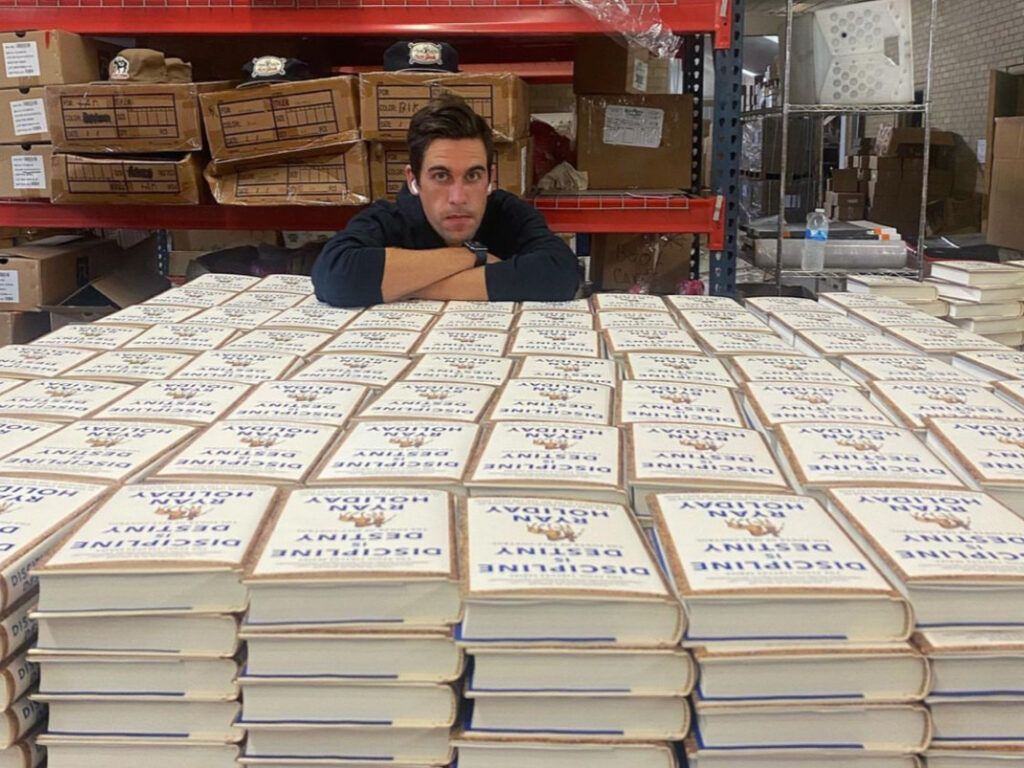
About the Author:
Ryan Holiday is the bestselling author of Trust Me, I’m Lying; The Obstacle Is the Way; Ego Is the Enemy; Conspiracy and other books about marketing, culture, and the human condition. His work has been translated into over 30 languages and has appeared everywhere from the New York Times to Fast Company. His company, Brass Check, has advised companies such as Google, TASER, and Complex, as well as multiplatinum musicians and some of the biggest authors in the world. He lives in Austin, Texas.
Additional Resources:
Ryan-Holiday.net | Main Website
Free Bonus Materials from Discipline is Destiny
The Daily Stoic - Inspiration from Ryan Holiday
Ryan Holiday's Recommended Reading List
The Competitive Advantage - "Discipline for Dreamers and Doers"
Discipline is Everything - Makaveli Motivation | YouTube
How Stoics Build and Maintain Self-Discipline | YouTube
2 Years of Writing a Book in 30 Minutes | YouTube
Discipline is Destiny: 25 Habits That Will Guarantee You Success
This Book on Amazon:
Discipline is Destiny, by Ryan Holiday
If You Liked This Book:
Courage is Calling, by Ryan Holiday
The Obstacle is the Way, by Ryan Holiday
Ego is the Enemy, by Ryan Holiday
Stillness is the Key, by Ryan Holiday
Discipline Equals Freedom, by Jocko Willink
Can't Hurt Me, by David Goggins
